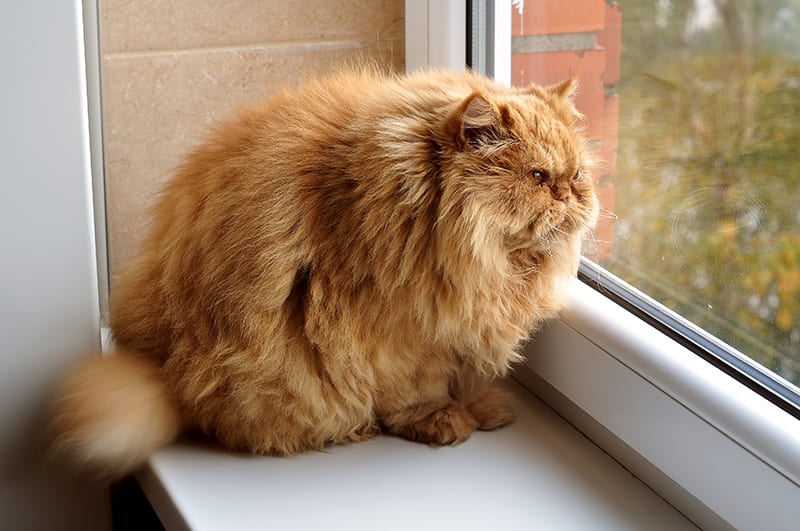Your Cat's Weight & Health
While it may not be something you think about, your cat's weight is an important element of their overall health. Just like people, when your kitty is carrying extra weight their risk of developing some serious and potentially life-threatening conditions increases substantially. As little as a few excess ounces can have a significant effect on your cat's vitality and overall health.
Health Risks Faced by Overweight Cats
If your feline friend is carrying excess weight they face an increased risk of developing these serious conditions:
- Diabetes
- Arthritis
- Urinary tract infections
- Joint pain
- Chronic inflammation
- Skin problems
How To Tell If Your Cat Is Overweight
To determine whether your kitty is overweight try the tips below..
Look for Your Cat's Waistline
- While your cat is standing, look down at them from directly above. Try to spot a slight indent just above your cat's hips where their waist should be (this can be a bit tricky with long-haired cats). If you can't see their waist or if their sides are bulging it means that your kitty is probably carrying excess weight.
Feel for Your Cat's Ribs
- When your cat is at a healthy weight you should be able to slightly feel their ribs by gently running your hand along their chest. If you can't feel your cat's ribs, your cat may be overweight.
Struggling to Jump
- Cats are designed to be agile runners and jumpers. If it takes multiple tries for your cat to jump up onto their favorite piece of furniture, or if your cat gives up altogether, their weight could be the problem.
Use Our Overweight Cat Chart
- Look over the illustration below to get a better understanding of your cat's weight category, and whether your cat may be carrying an extra pound or two.

Getting Your Cat's Weight Back On-track
Your cat's breed, age, and lifestyle all make a significant difference to their nutritional needs.
If you think that your kitty may be overweight make an appointment to see your veterinarian. Your vet will access your cat's current weight then let you know what your kitty's optimal weight is and how to help your feline friend reach their weight loss goals.
If your cat is just a little overweight, you may be able to continue feeding them their regular food but at reduced portion sizes.
If, on the other hand, your cat needs to lose a significant amount of weight, it may be best to switch your kitty over to a specialized food that is formulated to help cats lose weight.
Unexplained Weight Gain
If your cat has suddenly begun to put on weight without cause, it's time to see your vet. Unexplained weight gain can be a symptom of an underlying health issue.
Note: The advice provided in this post is intended for informational purposes and does not constitute medical advice regarding pets. For an accurate diagnosis of your pet's condition, please make an appointment with your vet.
Is your cat overweight? Contact us today to book an examination for your feline friend. Our vets can calculate your cat's nutritional needs and help you to get your cat's weight back on track.
Looking for a vet in the Thomasville area?
We're always accepting new patients, so contact our veterinary hospital today to book your pet's first appointment.
Related Articles View All
Matted Cat Hair - Grooming Senior Cats
Why do older cats get matted fur? How can you help your senior cat look and feel their very best? Read on to find out how to clean an old cat's fur and keep matting to a minimum.
Gingivitis in Cats - What it Is & What to Do
While dental healthcare may not be the first thing that pops into your mind when you think of cats, it is vitally important to the overall health of your feline friend. Today we delve into the topic of gingivitis in cats, what it is, signs to watch for and how it's treated.
Laser Spay or Traditional Spay: Which is Better?
It's time to get your pet spayed, but should you opt for laser spay or traditional spay? Today, we look at the differences between laser spay and traditional spay techniques, and the benefits of getting your dog or cat spayed.

